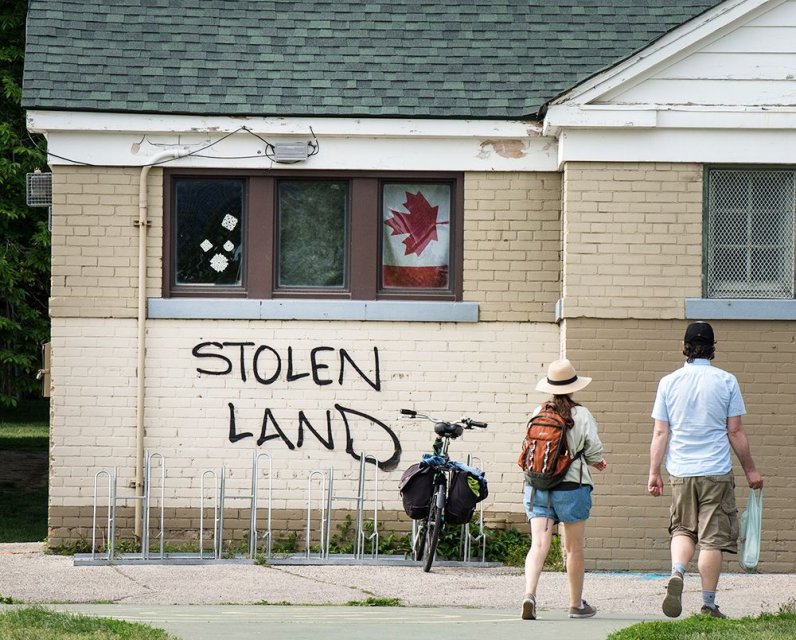Source Feed: National Post
Author: Adrian Humphreys
Publication Date: June 11, 2025 - 06:00
Canadians reject that they live on 'stolen' Indigenous land, although new poll reveals a generational divide
June 11, 2025

A majority of Canadians reject the idea they live on stolen Indigenous land, and the older people are, the more likely they are to say they don’t, according to a new public opinion poll.
Among all respondents across Canada, 52 per cent said they did not live on stolen Indigenous land, with 27 per cent saying they do. The remaining 21 per cent said they didn’t know or declined to answer.
Notably, there was a significant generational divide among those who answered
the national opinion survey
, conducted by Leger Marketing for the Association for Canadian Studies and provided to Postmedia.
More respondents in the youngest cohort, 18-to-24-year-olds, agreed they did live on stolen Indigenous land (41 per cent) than rejected the idea (37 per cent). That contrasts with those in the oldest age group of 65 years or older, who overwhelmingly said they did not live on stolen land (65 per cent) with only 15 per cent agreeing they did.
In between them, the remaining age groups were on an unbroken sliding scale in their answers: the older they were the more likely they were to reject the statement they lived on stolen land, and, conversely, the younger they were the more likely they were to agree that they did.
The sentiment rejecting the idea they live on stolen Indigenous land was a low majority regardless of the respondents’ region in Canada, except for in Atlantic Canada, where most people still rejected the idea, but at a nationally low rate of 44 per cent, with 29 per cent of Atlantic respondents saying yes, they do live on stolen land.
The type of land people live on also impacted their feelings on the issue.
Canadians living in rural areas were the least likely to agree they live on stolen Indigenous land, with urban dwellers the most likely to agree.
When asked to agree or disagree with the statement “I live on stolen Indigenous land,” 56 per cent of respondents living in a rural area said they disagree, 24 per cent said they agree, and 20 per cent said they didn’t know or didn’t answer. For those living in a suburban area, 50 per cent said they disagree, 29 per cent said they agree, and 21 per cent didn’t give an answer. For urban dwellers, 46 per cent disagreed, 34 per cent agreed and 20 per cent didn’t answer.
The city they live in also impacted opinions.
Those living in Calgary were the most vociferous in rejecting that their land is “stolen” among the cities named in the polling data. In Calgary, 69 per cent said no, 20 per cent said yes, and 11 per cent didn’t answer.
That differs sharply from those living in Edmonton, just 300 kilometres away in the same province, where respondents were the most amenable to the idea: 41 per cent said no, 32 per cent said yes, and 27 per cent didn’t answer.
Montrealers had the second most forceful rejection: 53 per cent said no, 26 per cent yes, and 21 per cent didn’t answer.
Next came those living in the Hamilton-Niagara peninsula, where 50 per cent said no, 27 per cent said yes, and 23 per cent didn’t answer, followed by the greater Ottawa area with 50 per cent saying no, 35 per cent saying yes, and 15 per cent not answering; Vancouver was next, where 45 per cent said yes, 34 per cent said no, and 21 per cent didn’t answer.
In the Greater Toronto Area, 43 per cent said no, 30 per cent said yes, and 27 per cent didn’t answer.
A majority of respondents who are Indigenous (53 per cent) said they live on stolen Indigenous land, although more than one third of Indigenous respondents (36 per cent) said no.
Homeowners are more likely to reject the belief they’re living on stolen Indigenous land than renters (53 per cent said no compared to 42 per cent).
Students (50 per cent) and the unemployed (37 per cent) are more likely to agree they live on stolen land than workers, with full-time workers (35) more likely to agree than part-time workers (30).
Respondents who described themselves as non-immigrants are more likely to reject that they live on stolen land than those who identified as immigrants (51 per cent compared to 44 per cent).
“Most Canadians reject the idea that they live on stolen Indigenous lands,” said Jack Jedwab, president of the Montreal-based Association for Canadian Studies.
“This reflects not just a disagreement over language, but a deeper divide in how people view Canada’s history — highlighting ongoing political conversations about land ownership and societal values.
“The findings also raise important questions about the impact of public land acknowledgments, particularly when they are made without genuine understanding or conviction…. The survey results suggest that requiring Canadians to publicly acknowledge they live on stolen Indigenous lands would imply that the majority does so without conviction.”
The poll asking Canadians if they think they live on “stolen” Indigenous land suggests it may be more palatable to use a different word: unceded.
The term unceded has become popular in modern usage, particularly in land acknowledgements that are frequently read at the start of government meetings and official public gatherings.
Even King Charles III in his recent throne speech in Ottawa began by saying: “I would like to acknowledge that we are gathered on the unceded territory of the Algonquin Anishinaabeg people. This land acknowledgement is a recognition of shared history as a nation.”
There has been some pushback. In April professors launched a lawsuit against the at the University of British Columbia complaining that land acknowledgments saying the school is on “unceded Indigenous” land violates legislation requiring universities to be non-political. The petition claims the word unceded “is often considered synonymous or closely affiliated in meaning with the assertion that the territory of Canada is ‘stolen land’ and that the speaker, at least to some degree, and in this respect, does not recognize Canada as a lawful or legitimate state.”
Compared to the 52 per cent who declared in the recent poll they did not live on “stolen Indigenous land,” a 2021 survey found only 42 per cent of respondents rejected the statement that they live on “unceded Indigenous territory.”
“Paradoxically, the push back on the word ‘stolen’ may reflect not indifference, but the weight and seriousness people associate with it, and what such acknowledgement might imply,” said Jedwab. “Dismissing such views does little to advance issues that are highly relevant for the country’s past and future.”
The public opinion survey was conducted with 1,537 adult respondents in Canada from May 16 to 18. As a non-probability sample in a panel survey, traditional margins of error do not apply.
• Email: ahumphreys@postmedia.com | Twitter: AD_Humphreys
Our website is the place for the latest breaking news, exclusive scoops, longreads and provocative commentary. Please bookmark nationalpost.com and sign up for our daily newsletter, Posted, here.
The Toronto Raptors have signed free agent forward-centre Sandro Mamukelashvili, the team announced Friday.
July 4, 2025 - 09:37 | Globalnews Digital | Global News - Ottawa
Automakers met with Prime Minister Mark Carney, and discussed challenges with current electric vehicle mandates given the added challenges of the trade war and tariffs.
July 4, 2025 - 09:20 | Globalnews Digital | Global News - Canada
July 4, 2025 - 09:10 | | CBC News - Canada



Comments
Be the first to comment